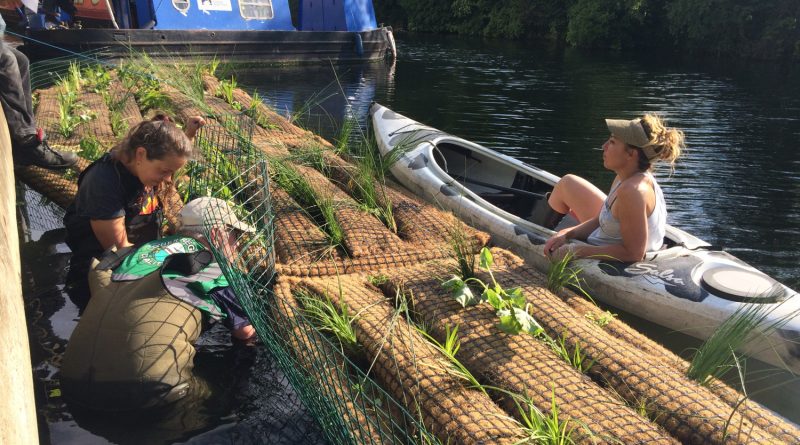Channeling hope: how East End canals are providing respite from city life
Environmental correspondent Lizzy has always been passionate about the environment. Since 2016 she has been reducing her non-recyclable waste and is currently working with Roman Road Trust and Globe Town Assembly on the Plastic-free Roman Road project.
In our corner of London there are many opportunities to explore and experience the beauty of the canal environment, and even join with local community initiatives to enhance it.
On the 15th June the East London Environmental Network will hold the first Splash! East London Festival of Rivers and Oceans. There’s a lot to celebrate around here.
Roman Road may not feel near the river or the ocean (apart from spotting the occasional seagull do battle with a pigeon) but we are directly connected via the Regent’s Canal and Hertford Union Canal.
It’s easy to forget these bodies of water. Originally built to transport industrial and agricultural goods 200 years ago, they are hidden away behind buildings, below street level and under bridges or tunnels.
This seclusion, once meant to hide the grime and noise from city dwellers, now ironically provides calm and respite from city life, for humans and non-humans alike.
Enhancing biodiversity
Our waterways now provide incredibly diverse habitats for wildlife. Around 30% of the UK’s canals are officially recognised as important nature sites, including the whole of London’s canal network. Their slow flow and managed water levels provide a unique habitat and opportunities for nature conservation.
This wildlife is celebrated at the Ecology Pavilion and Ecology Garden in Mile End Park.
To enhance it further, the Lower Regents Coalition and The Wildlife Gardeners of Haggerston recently created 75 metres of new floating planters at Mile End and Haggerston.
The Coalition are a great example of the canal adoption programme which enables community groups to adopt a stretch of canal, working with the Canal and Rivers Trust on management and enhancement plans. They have adopted a two-mile stretch between Mile End and Limehouse.
Friends of Meath Gardens are keen to adopt the stretch that flows under Roman Road. They are looking for new members to lead on this aspect of the group’s activities. Could it be you? Contact Tunde or Joanna via their Facebook page.
Cleaning our canals
The Freshwater Habitats Trust estimates 95% of the UK’s canal length has compromised water quality. Although they’ve come a long way from their grimy past, there’s more we can do to make them cleaner and safer.
For example, when fertilisers and pesticides enter the water, this can create dead zones – areas with levels of oxygen so low as to be unable to sustain life. In 2015 60,000 fish suffocated in the Grand Union Canal in Leicestershire when a two-mile stretch became polluted with farm slurry.
Pollution-busting plants
Luckily nature has some of the answers! Some plants can absorb these pollutants, such as the reed beds recently planted by Thames21 and the London Wildlife Trust.
Volunteer at a clean-up
Some things plants can’t remove! Help them out at a litter-pick:
- The Lower Regents Coalition holds monthly sessions just south of Roman Road.
- Plastic-free Hackney runs them just north of here.
- Plastic-free Roman Road held our first in April and plan to run two per year.
Preventing pollution in the first place
Many pollutants reach our canals via outlet pipes from drains managed by Thames Water, including waste from industry and households. In addition, anything applied to the land – including roads and gardens as well as farmland – washes directly into our waterways without treatment.
Keeping our canals clean therefore requires improving water treatment systems to remove more harmful substances before they are discharged into the environment, and changing the substances we habitually use.
Some of the ways we can support these changes include:
Changes at home
Many everyday household products are dangerous to marine ecosystems and are not removed in the water treatment process.
- Make eco-friendly cleaning products at Sunny Jar’s DIY Natural Cleaning workshop at the Create Place on 26th June.
- Don’t throw paints, oils or other litter down your drains. Dispose of them according to the label, or donate leftover paint to the Forest Recycling Project.
- Consider what you buy in the first place – follow Harry and Meghan and choose organic paints!
- Reduce or even eliminate your use of artificial fertilisers, pesticides and insecticides.
- Reduce your use of single-use plastics.
Petitions for change
- Ask the Environment Agency and Ofwat to increase their efforts to cut pollution from outlet pipes.
- Ask Tower Hamlets Council to ban dangerous pesticides in our borough.
- Keep heavy polluting industry away from our canal system. Ask the Mayor of London to refuse planning permission for four concrete factories near the Olympic Park.
Caring for our canals: a beacon for the future?
The transformation of our canals from heavily polluted industrial thoroughfares to incredibly biodiverse areas of wildlife where people gather either to slow down and relax, or to work together to protect them, is a beacon of hope for transforming other aspects of the city and of our modern society in general.
As we move away from reliance on fossil fuels, from private car ownership, and from an unsustainable pursuit of constant economic growth, production and consumption – three societal changes we must make – could our streets become an equally abundant network of green corridors through our city? Where people gather to enjoy leisure activities, or to work together to make them safer and cleaner spaces for all?
Why not join Better Streets for Tower Hamlets, a local group already campaigning for these changes?
Until then, enjoy the Splash! East London Festival of Rivers and Oceans this weekend and consider how communally caring for our local canals contributes to the global effort to preserve our oceans.
If you enjoyed this piece you may like our article on how to get involved in East End food gardens


